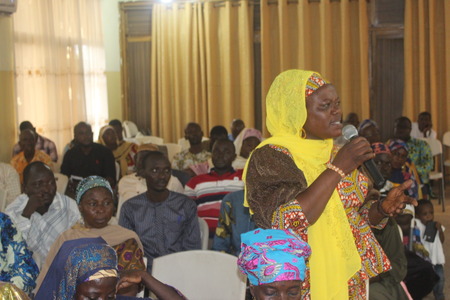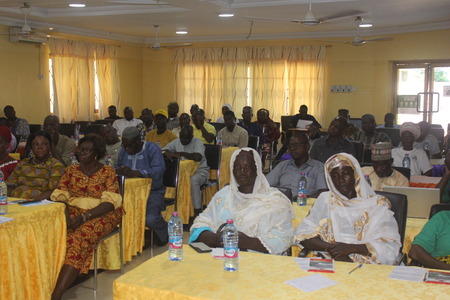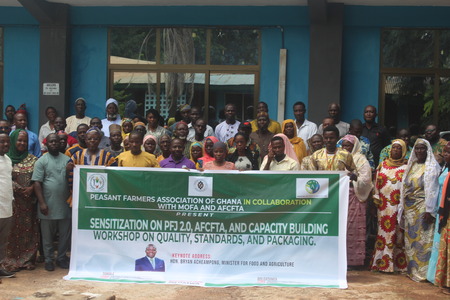The Peasant Farmers Association of Ghana (PFAG) in partnership with the National AfCFTA Coordinating Office (NCO), under the Ministry of Trade and Industry (MOTI), organized a capacity building exercise on the “AfCFTA and Market Access Opportunities for Farmers and Aggregators in Ghana”. The capacity building exercise, which took place in Tamale in the Northern Region and Bolgatanga in the Upper East Region of Ghana, was to expose and equip farmers and aggregators with adequate information and tools to enable them fully participate and take up opportunities presented in the African Continental Free Trade Area (AfCFTA) pact. The participants were made up of farmers, aggregators, District and Regional Directors of Agriculture, Civil Society Organizations and the media and they were drawn from several districts in the Upper East, Upper West, North East and Northern regions.

Giving his opening remarks, the Executive Director of PFAG, Dr. Charles Nyaaba indicated that since the commencement of the AfCFTA, the PFAG has embarked on various activities to ensure that farmers are not left out of the continental market space opportunity. He emphasized that with the support from the Open Society Foundations (OSF), the PFAG undertook an assessment of the AfCFTA to understand the implications and opportunities for farmers. The results, according to him, revealed that majority of farmers and aggregators were not fully apprised of the framework and had little or no information on its modalities. Also, information dissemination on the AfCFTA was limited to mid to high level stakeholders leaving, farmers and other producers behind.
He reckoned that, the PFAG during the validation of the report had series of engagement with the Ministry of Trade and Industry, which also contributed to the setting up of an Information Desk at the Ministry for the dissemination of information on the AfCFTA. He continued that the Ministry and PFAG subsequently partnered to organize the capacity building session to throw more light on specific aspects of the AfCFTA that will be beneficial to farmers and aggregators. He was hopeful that farmers will take advantage of the added knowledge and expand their business models beyond the shores of Ghana.

The Principal Industrial and Promotion Officer of the NCO, Mr. Wilfred Essuman took farmers and participants through the opportunities under the AfCFTA. He outlined the components of the National AfCFTA Policy Framework and Action Plan, which is the working document guiding AfCFTA implementation in Ghana. He added that the AfCFTA provided opportunities for farmers to substitute cereal import from Non-State Party of the AfCFTA, have access to cheaper cost of inputs from the continent, reduce barriers in trade, expedited custom clearance process and mutual recognition of sanitary and phyto-sanitary certificates across Africa. He added that these will lead to relatively lower tariffs on produce from other countries, increased demand for produce and increased revenue.
The participants were then taken through the processes of positioning themselves to take advantage of the market opportunities. This includes compliance to meet requirements, production of commodities in commercial quantities, aggregation and standardization, improved packaging, among others. They were also taken through the steps to trade under the AfCFTA, through the lens of the Planting for Food and Jobs Program Phase II (PFJ 2.0) The farmers were encouraged to assess market prospects for their products, ensure that their product is among the country’s list of tariff concession and also apply for certificate of origin in Ghana. The participants were then taken through the registration process and the procedures for trading under the AfCFTA.
The farmers expressed their gratitude and highlighted the importance of the training to them. Mr. Amadu Salifu, a farmer from Wa in the Upper West Region was particularly grateful to be part of the training. He said “I am happy to have this information on the AfCFTA. In Wa, I have tried several times to get information on the registration process but have been told to come to Accra. I am happy to know that there are avenues in my region where I can get information on the AfCFTA and also register my business.”


leave a comment
You must be logged in to post a comment.